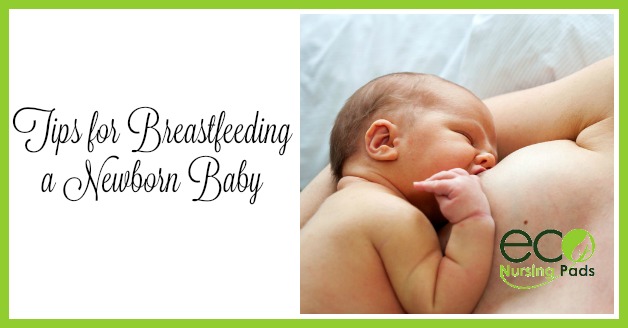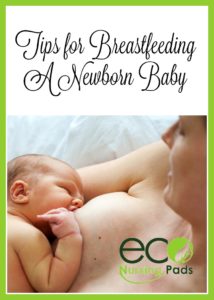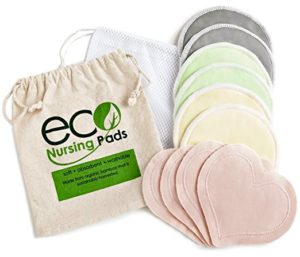Tips for Breastfeeding a Newborn Baby

Breastfeeding your newborn baby correctly helps with breast milk production. At first, baby eats precious colostrum. When milk comes in a few days later, you will adjust to a full supply. As breast milk production increases, baby’s latch may change, you may experience engorgement and typically leaking. Washable breast pads are a great way to absorb leaks when baby is not nursing, when baby is nursing on one breast and the other is leaking and to protect your bra from nipple cream. Unlike disposable breast pads, reusable breast pads are free from chemicals and environmentally friendly. Here are some tips for breastfeeding a newborn baby. Post contains affiliate links.

Tip 1: Nurse on Demand
This sounds like common sense, and it is! Nursing on demand simply means to breastfeed whenever baby is hungry. A newborn baby has a teeny tiny belly. Breast milk digests easily and your newborn will nurse constantly. This helps comfort baby, encourage breast milk production and helps your uterus return to a smaller size faster. Breastfeeding baby releases oxytocin, the feel good hormone, which helps the uterus contract and helps you bond with baby. (1) Get a stack of good books to read, a great nursing pillow , learn to nurse lying down in side-lying and take the opportunity to rest and heal.
Tip 2: Have a Good Support System
A great support system is will be extremely valuable to you. Make sure friends, family and your significant other know what to expect from both you and your baby. Encourage them to help with chores, hold baby so you can shower and help with day to day activities. Breastfeeding a newborn can make Mom hungry. Having someone make up a snack bin that can be kept right by your spot on the couch or in bed. It will be a life-saver when you’re in the middle of a nurse-a-thon and can’t get up to find your favorite snack bar. Don’t have a supportive family? Find great groups online and your local La Leche League chapter!
(Pin image below)

Tip 3: Buy Reusable Nursing Pads
Don’t be surprised by leaks. Use soft, Eco-friendly, washable breast pads to line your favorite nursing bra, save shirts from breast milk leaks and even comfort sore nipples. They’ll protect your nursing bra and clothes from natural nipple butter and prevent nipples from showing through your shirt. Reusable breast pads are long lasting, make a great baby shower gift and the best part may be that you never run out! You simply wash them in your regular laundry as needed.
Tip 4: Get a Baby Carrier
One of the most common things I hear from new Moms is “I can’t put my baby down!” It’s true. Newborn babies are used to the environment of the womb. They were warm 24/7, fed constantly by the umbilical cord and are feeling new things every moment. From the first feelings of hunger, the coolness of air to the sensation of movement, a great baby carrier is a loving way to keep baby close and happy. In addition, a baby carrier is a great way to get skin to skin contact and increase breast milk production. With an infant insert, it can be used from the newborn stage through toddlerhood and beyond!
Tip 5: Find an International Board Certified Lactation Consultant (IBCLC)
In my experience, the first six weeks are the hardest. With my first baby, I was surprised by how often he nursed and I was afraid that something was wrong. Terrified is a better word. The reassuring words from an IBCLC encouraging me to nurse frequently, wait for my supply to regulate around 6 weeks and tips for altering my diet for fussiness were extremely valuable. While there are many people who will offer advice, you can be sure that an IBCLC has the knowledge and experience to help solve any issues that may arise. (2)
Remember, breastfeeding a newborn baby is a learning experience for you and your baby. Nursing on demand and soon after birth is beneficial to you both and can be demanding. Ask for help if you need it, get a great baby carrier and a supply or washable nursing pads. Breastfeed while you catch up on Netflix shows, your favorite books or socialize on facebook. Remember that your breastfeeding relationship is constantly changing and as your baby goes through growth spurts, teething and begins to eat solid foods there are always adjustments to be made.
Disclosure: This post makes no attempts to diagnose, treat or replace medical advice.
- http://www.llli.org/nb/nbjulaug01p124.html
- http://amzn.to/2fILVmy

